The month of January and a health emergency declared in the state of Washington because of a measles outbreak had me thinking about an uncle I never knew.
This is a continuing series about my uncle Wilbur Thomas Hoskins, who died at five years of age due to complications following measles. You can catch up here:
A Tow-headed Boy
Measles
Who was with the family?
Funeral Record
The Salvation Army Offers Assistance
Letters of Condolence
(I took a couple of weeks off for rest and recuperation from major surgery and beginning chemo after my new cancer diagnosis. Actually, one week was more for doing whatever I wanted because I felt pretty good the week before I started the new chemo routine. I’m going to finish this series so I can go on to something new – like trying to find photos to match the Sepia Saturday prompt! Alas, I think there are two more posts in this series. One today, and one – hopefully – next week.)
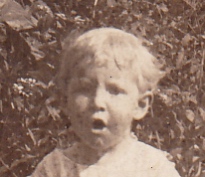 All that remains of the paper trail to help me piece together the story of little Wilbur’s life and death are receipts for payments of medical and funeral expenses. My grandparents appear to have kept most of the receipts, although a few are missing. My grandfather is always noted as the person who made the payment and I assume he did this in person and paid cash. It must have been painful to do this month after month.
All that remains of the paper trail to help me piece together the story of little Wilbur’s life and death are receipts for payments of medical and funeral expenses. My grandparents appear to have kept most of the receipts, although a few are missing. My grandfather is always noted as the person who made the payment and I assume he did this in person and paid cash. It must have been painful to do this month after month.
In April and May of 1930, my grandfather made $5.00 and $10.00 payments to St. Anthony’s Hospital. The May receipt shows a balance due of $5.00, which was presumably paid in June, if Grandpa kept to his payment schedule. Wilbur died in January; there may have been payments made to the hospital in both January and February, so I can’t determine how much the total charges were for his hospitalization.
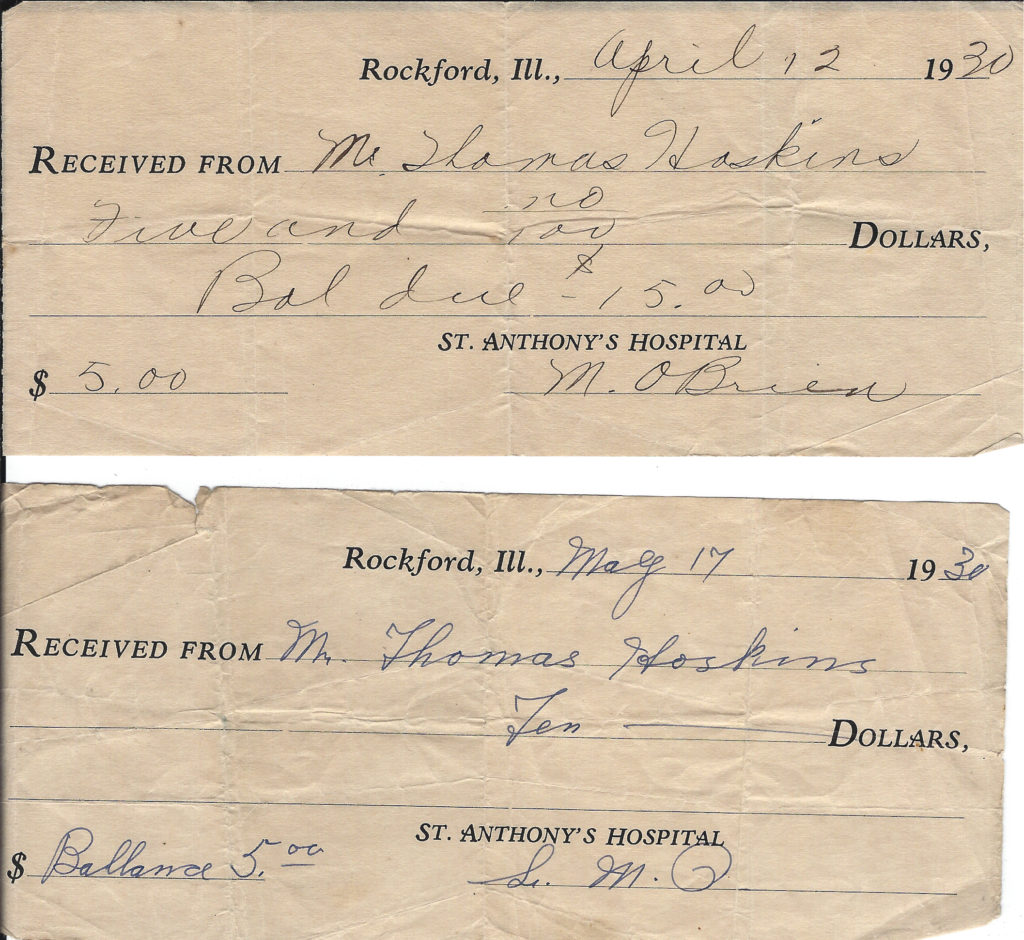
Funeral expenses totaled $78.00, for which my grandfather paid down $42.00 on the day of the funeral, leaving a balance of $36.00. He paid off this bill in $5.00-6.00 increments. Receipts through August 9th account for $26.00 of that balance.
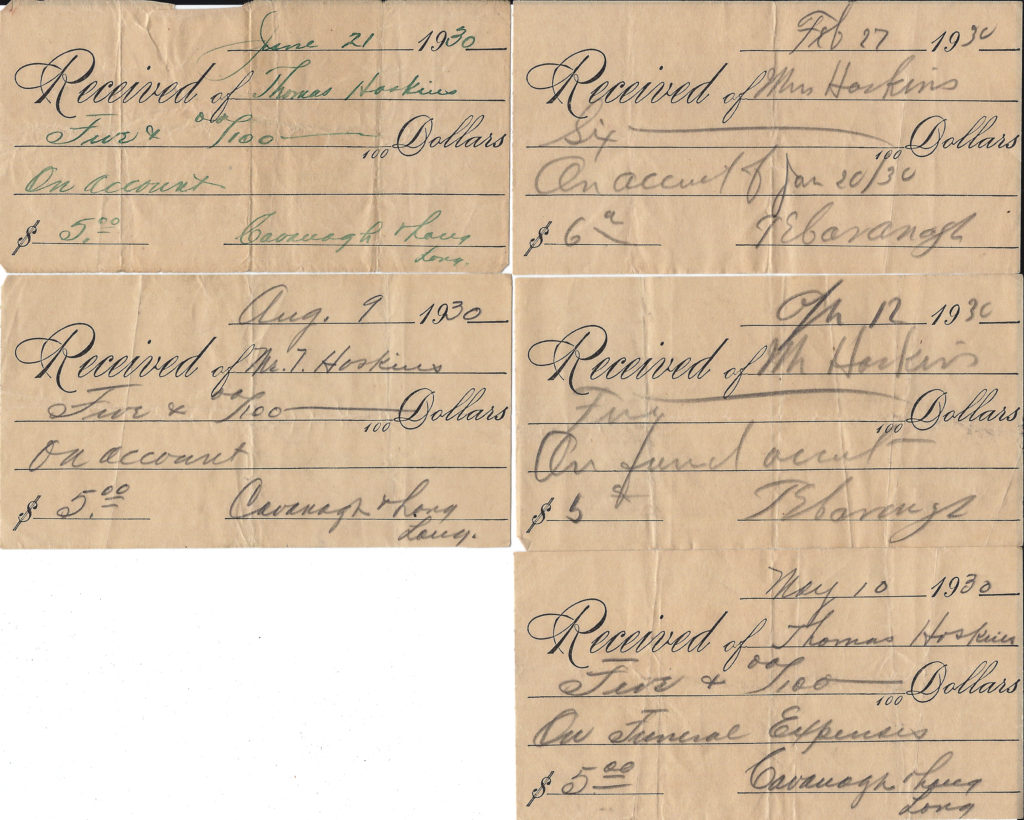
And there were doctor bills to pay. Two receipts are in payment to Charles L. Leonard, M. D. One dated February 21st shows $1.00 paid and a balance of $4.00. A receipt dated August clears that debt.
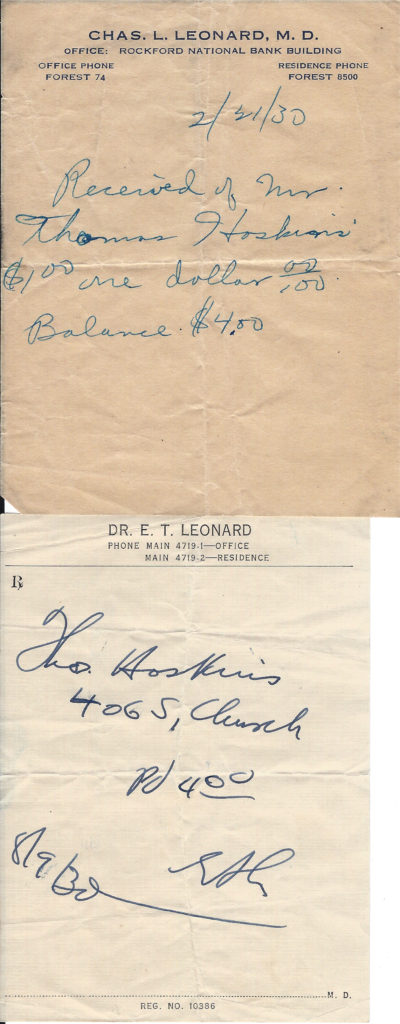
There are several receipts for payments made to Dr. R. M. Bissekumer. Dr. Bissekumer and Dr. Leonard both had offices in the Rockford National Bank Building, but on different floors. With a balance due of $49.50 before the May payment, my grandparents must have owed Dr. Bissekumer at least $59.50 for the medical care he provided to Wilbur during his illness.
It makes sense to me that my grandparents first took Wilbur to Dr. Leonard and that Dr. Bissekumer treated Wilbur in the hospital – accounting for the larger bill for his services.
Dr. Bissekumer’s receipts are a bit more professional in appearance than Dr. Leonard’s.
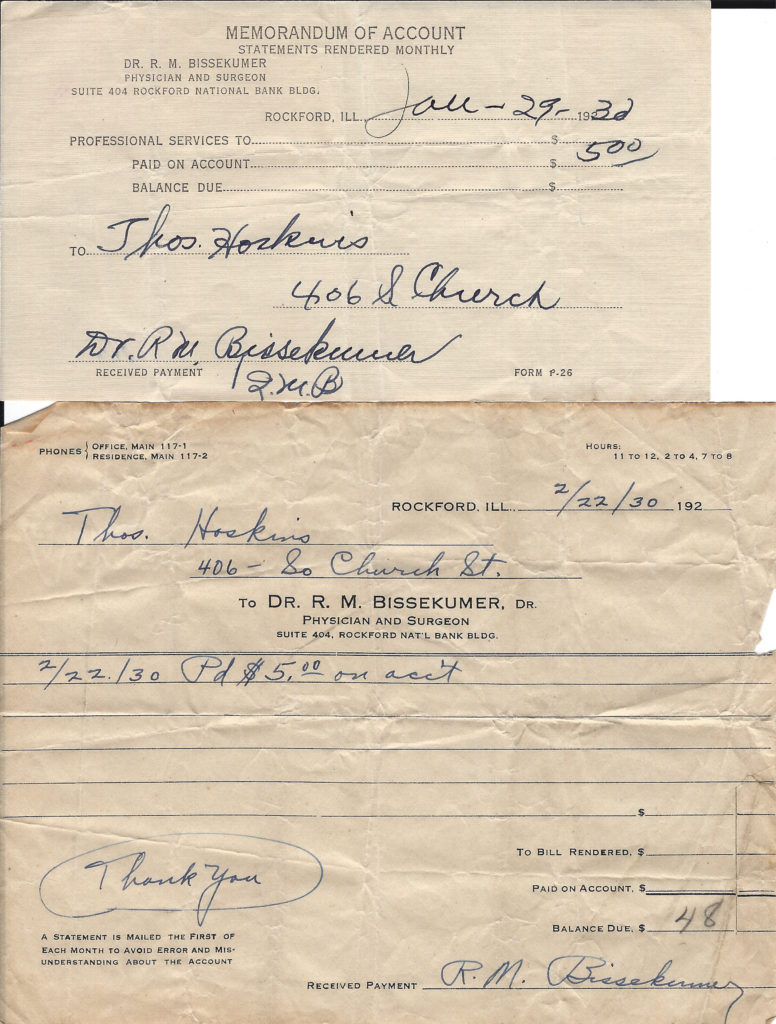
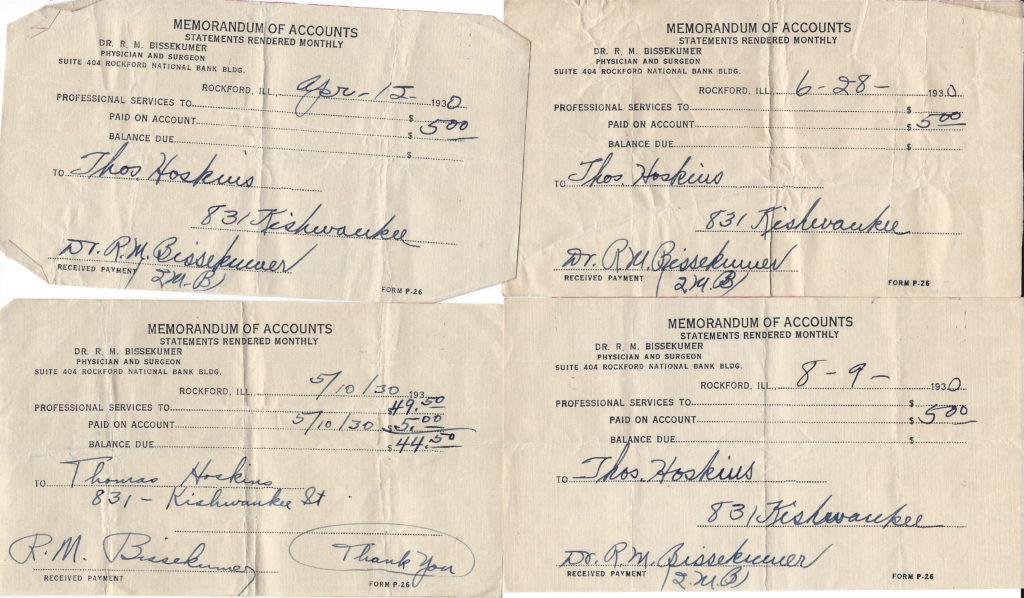
One item of interest to me is a change of address for my grandfather between the January 29th payment and the April 12th payment. I’ll be looking into that later.
In all, I can account for $107 of debt accrued to pay for Wilbur’s medical and funeral expenses. I believe it was more since I’m not sure of the total amount for the hospital. Using a handy inflation calculator, $107 in 1930 would be equal to $1,628.72 in 2019. Truly a hardship on my grandparents during these Depression years when my grandfather’s employment was anything but steady.
I couldn’t help but try to find information about the doctors, funeral home, etc. to see what else I might find to add context to the story. Who were these doctors?
I can’t be sure if this is the Dr. Leonard in question, but this clipping sheds light on the number of cases of measles in Illinois in the year prior to Wilbur’s death.
Dr. Roger Bissekumer yielded more hits in my search. He was apparently a respected doctor, establishing his practice as a physician and surgeon in 1918. He was appointed to the position of District Health Officer in the State Health Department in 1933.
Dr. Bissekumer was married in June of 1923, about seven years before my grandparents met him. By September of 1925, his young wife was dead.
Dr. Bissekumer had remarried by the time my grandparents came into contact with the thirty-six-year-old physician in January 1930. Sometime after 1930, he and his wife Alice became the parents of two children. And sometime after 1933, Alice disappeared from the picture. In 1935, the doctor married Bernadine, an assistant surgical supervisor at St. Anthony’s Hospital. Bernadine gave birth to a daughter in September of 1936 and required hospitalization following a Caesarian section. At least two of the doctor’s wives were accomplished musicians, known locally for giving recitals, performing on the radio, or playing at social events. All were in their twenties when they married. He got older; his wives did not.
As if the tragic death of his first wife, a possible divorce from his second wife, and a difficult birth for his third wife weren’t enough, the doctor’s younger brother, Francis, died in 1940. Francis, who had joined his brother’s medical practice, died of a heart attack at thirty-five years of age.
Unfortunately, his story does not get better. Bernadine filed for divorce in 1943 and the scandalous case played out in the newspapers for several years. The doctor’s wife asked for custody of her child as well as the two children from his previous marriage. She claimed habitual drunkenness and “extreme and repeated cruelty.” The charges against Dr. Bissekumer were dropped, but Bernadine finally won her case in 1945, after several additional hearings and appeals.
Dr. Bissekumer was arrested for DUI in 1943, and apparently again in 1946. Perhaps there were other incidents. In February of 1947, he lost his right to drive for one year. It is sad to note that he collapsed in the courtroom and was taken to the hospital.
One month later, Dr. Bissekumer’s tragic life ended. The newspaper clippings offer no details and I found no obituary.
Bernadine remarried in May.
I did not intend to go into such detail about any of the people my grandparents encountered during their time in Rockford. And I don’t know that this sheds any light on the care that he provided. Did he already have a drinking problem in 1930 when he treated Wilbur and gave medical advice to my grandparents? I don’t know.
Two sad stories that intersected in Rockford, Illinois during a measles outbreak in January, 1930.
This is my contribution to Sepia Saturday and does not in any way match the prompt photo. Please visit other participants here who have surely found some interesting interpretations.
Sepia Saturday provides bloggers with an opportunity to share their history through the medium of photographs. Historical photographs of any age or kind become the launchpad for explorations of family history, local history and social history in fact or fiction, poetry or prose, words or further images. If you want to play along, sign up to the link, try to visit as many of the other participants as possible, and have fun.

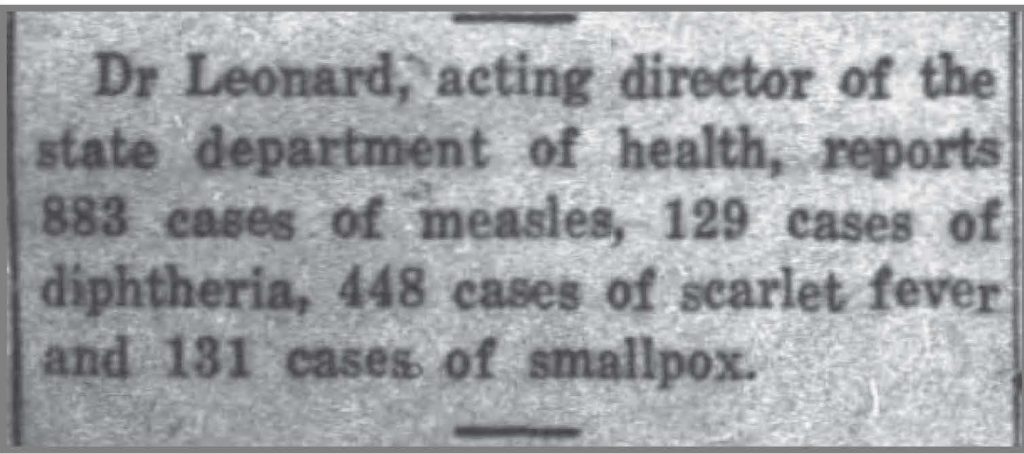
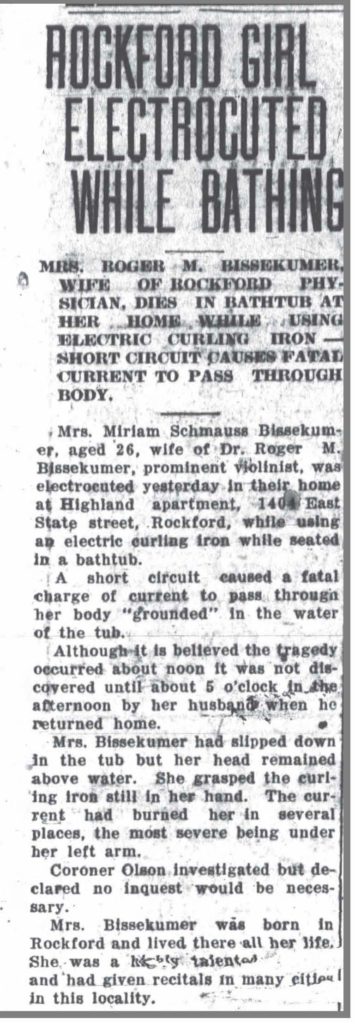
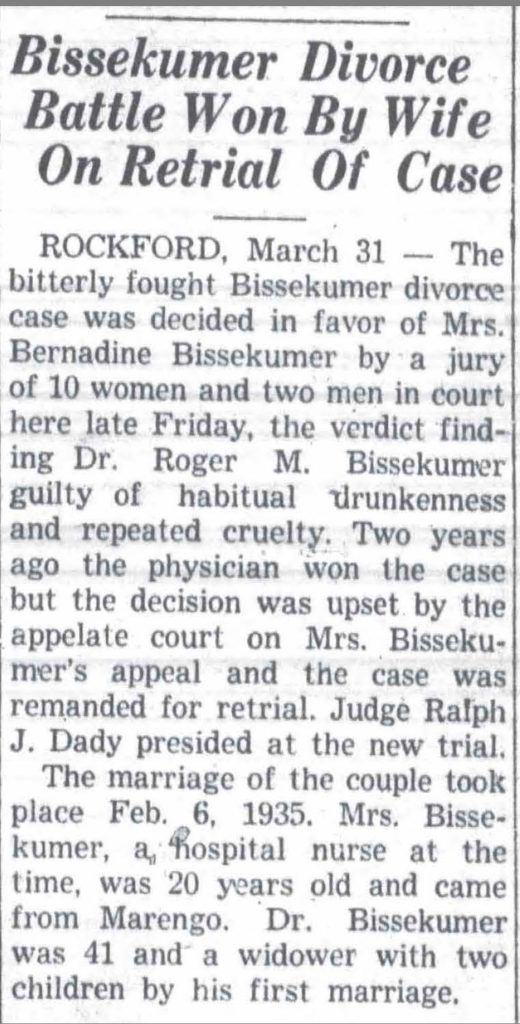
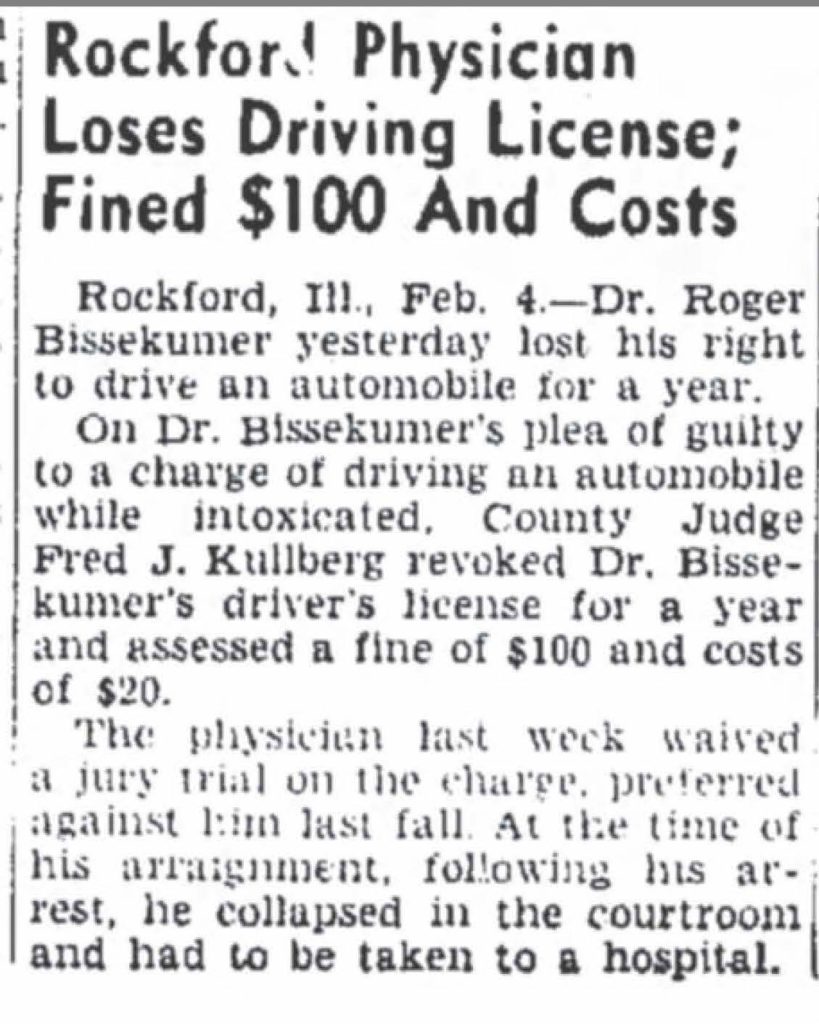
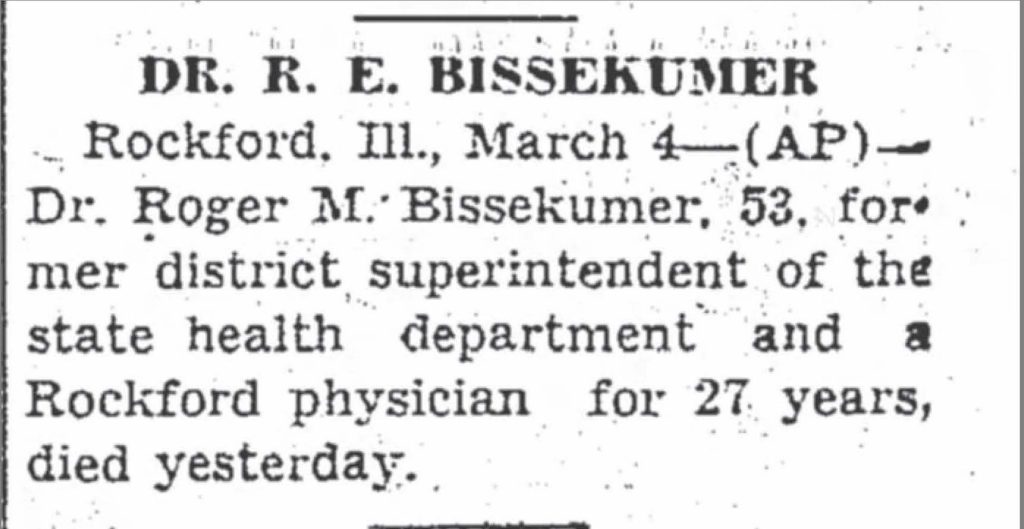
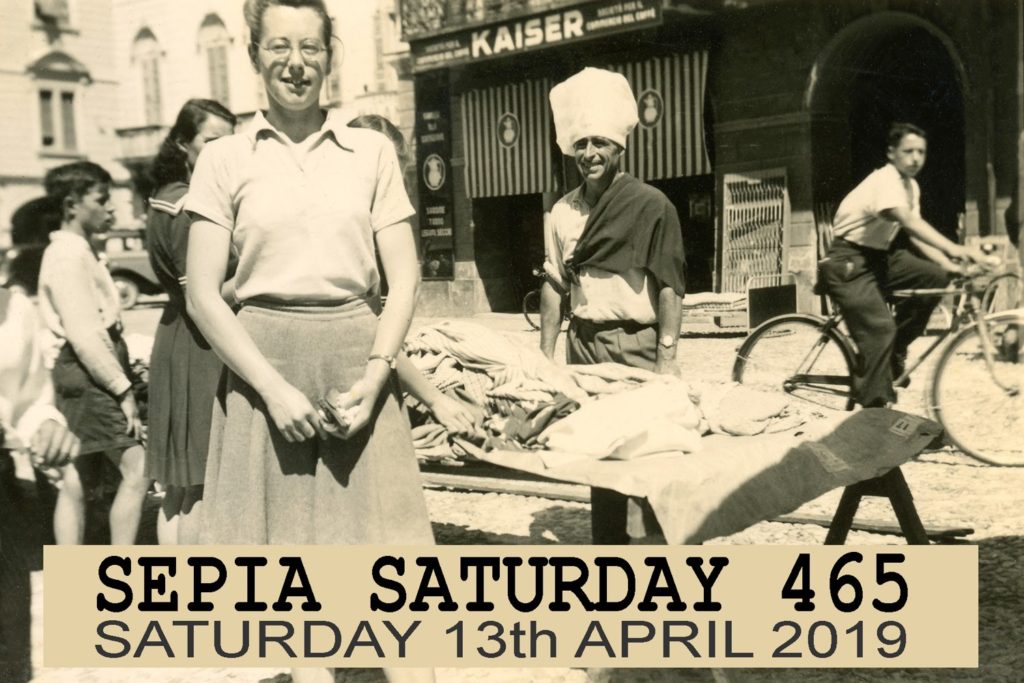
Cool that you have these bills and documents.
I hope you’re doing well.
Yes – they help shed some light on the story. As for me – so far, so good!
It’s hard to believe someone would be stupid enough to use an electric appliance while seated in a bathtub full of water, but people have been known to do stupider things. What a shame – though with Dr. Bissekumer’s reputation, one might wonder?
I had the same thought. Surely she knew better, but things like this still happen.
Wow – such devoted sleuthing! Fascinating how seemingly inconsequential documents gain significance so much later. Reminds me a bit of the premise of “A Canticle for Leibowitz.”
I’m not as well-read as you are Sean – I had to look up your reference. Sounds like I may need to add it to my very tall stack and long list of “to-read”s.
I’ve found that if I look at something enough times over the years, I may find something of interest that I’ve always considered unimportant.
I come from a family of dedicated savers. Receipts from my parent’s 1960s appliances, check stubs from bank accounts long closed, my dad’s 1946 pay books, my grandparent’s 1936 mortgage for their $7,800 house, etc., etc., all were dutifully filed away in shoe boxes and desk drawers. And as the single child of a single child it’s all become my inheritance. At times I feel like a library archivist of maybe a trash collector. Yet I know this kind of rare ephemera is how we can best understand the past. Of course now all my financial stuff is digitized. Too boring for future genealogists. No signatures. No personalized “Thank You”.
I’m glad you told the doctors’ stories. To see the number of cases of measles, diphtheria, and small pox is chilling. And the tragic death of the violinist wife has more details than we ever get in today’s newspapers. The circumstances are too strange to be believable.
I’m always torn about what to save and what to throw. I’m always thrilled when I find these saved bits of paper, but when it is your own … I’m torn. Plus, my husband is not a hoarder like I am. I’m always thinking, “I might want this some day.”
I’m glad I researched the doctors. Interesting story, for sure.
You have gotten a lot of mileage about a person you didn’t know. I would have been done in a week. The stories about the doctors are very interesting, and while not about your uncle, they do say a lot about his world. You do have to wonder whether the doctor had a drinking problem when he cared for your uncle. The doctor who removed my daughter’s tonsils when she was about 6 committed suicide several months later. I sometimes wonder how he kept it together to do such a fine job with her. We were lucky.
I have gotten a lot of mileage out of this! Haha! I do that sometimes. My grandmother and her father delivered her youngest sister because the doctor showed up drunk and my great-grandfather wouldn’t let him near his wife. I do wonder about Dr. Bissekumer and the weird circumstances of his first wife’s death. Was that the beginning of his drinking problem or did it develop later? Was he already drinking and abusive when she died? He apparently gave good care for many years to maintain his reputation as long as he did, but it seems he had lost all respect by the time of his death. With such a cursory death notice, I wonder if he died by suicide or if he was considered no longer worth the ink?
My best wishes for your treatment and recovery. This has been a very moving series about your uncle — with an excellent backstory on his doctors — and it’s heartbreaking to see those receipts for expenses your grandparents had to pay after he was gone. There have been recent outbreaks of measles in New York City and state among unvaccinated children and populations. Your posts bring home the deadly risks of a seemingly “harmless” childhood disease like measles. What your grandparents might not have given for a vaccine back then.
Thank you! I’m doing well so far!
I just can’t fathom parents not vaccinating their children.
It did make me sad going through these receipts – little bits of money – as much as they could afford each month to pay off their debts. A constant worry and reminder.